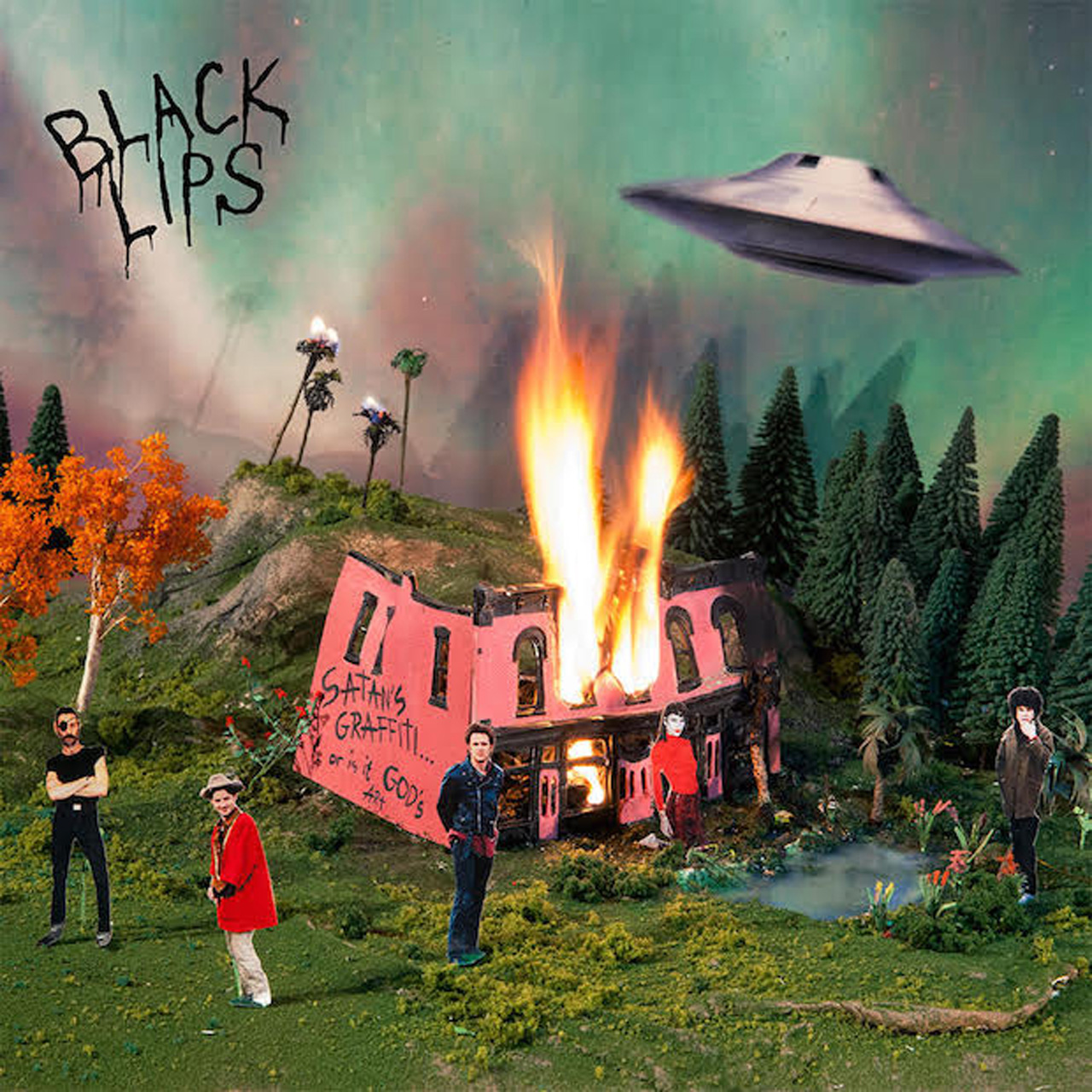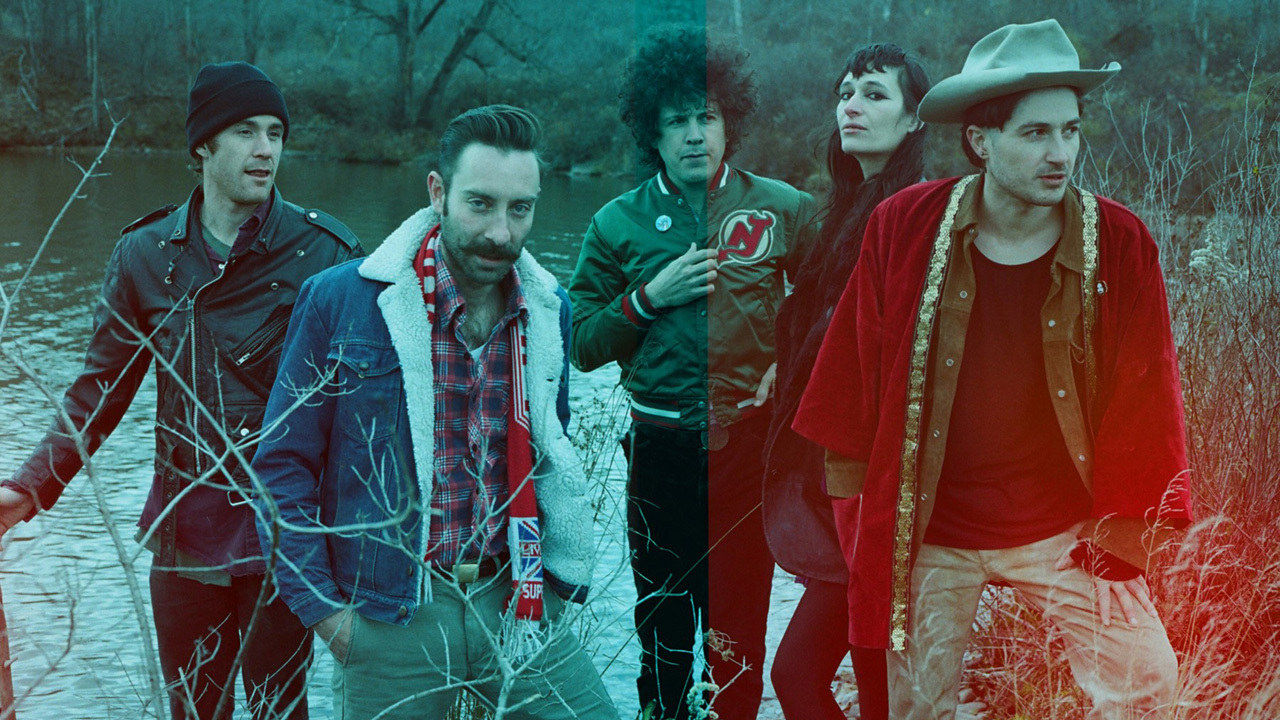Jared Swilley knows exactly what he wants to do if his band, Black Lips, ever get invited to play the Super Bowl halftime show. Not for them the usual multi- all-singing, all-dancing, million-dollar showbiz spectacle of America’s most-watched annual TV event. “We’d have empty beer cans and garbage and shoot it all over the audience,” the bassist says gleefully. “And we’d have really shitty, dangerous pyrotechnics.”
It’s unlikely that the Super Bowl front rows need to worry just yet about a garage rock band from Atlanta, Georgia spraying them with trash before immolating them, but then everyone should have their dreams.
Black Lips thrive on the kind of chaos that involves empty beer cans and life-threatening explosions. Eight albums in, they’ve carved out a niche as rock’n’roll lords of misrule. Their charge sheet is impressive: they’ve been banned from India; they wound up Gene Simmons by demanding the Kiss Army lay down their guitars and surrender (spoiler: they didn’t); their live shows have become semi-legendary for the chaos onstage and off. They’ve even coined a name for it: Oppositional Defiance Disorder.
“We’ve never gone out of our way to offend,” explains Swilley. “Even when we try not to offend people, they get upset. We just like to have a good time.”
Black Lips might have dialled back the mischief, but their music remains a law unto itself. Two parts 60s-influenced rock’n’roll to one part punk rock, with a twist of fucked-up country, it’s a throwback to a more joyous, less calculated time. The fact that they once approached Phil Spector to produce one of their albums tells you everything you need to know about them.
“I didn’t know about it,” says Swilley. “That was something that Cole [Alexander, guitarist/vocalist] set up. I only found out about it afterwards. He’s probably my favourite producer of all time, but I thought it would have been kind of tacky cos he’s in prison for murdering a woman. Plus it would have been a logistical nightmare.”
Homicidal 60s pioneers aside, they’ve managed to rope in a series of marquee-name producers over the years, including the Black Keys’ Patrick Carney and pop nabob Mark Ronson. For their latest album, Satan’s Graffiti Or God’s Art?, they enlisted Sean ‘Son Of John’ Lennon, who invited the band to his farm in upstate New York. Sean’s mother, Yoko Ono, makes a guest appearance on the album.
“At first it’s surreal,” says Swilley. “But after a while it was just our friend’s mum being there.”
The album’s title refers to a sign the bassist spotted while passing a church in America’s Deep South (“I’d be really curious to hear what that sermon was about”). Ironically, Swilley himself is the son of a former bishop in the band’s home town of Atlanta, Georgia, albeit “a liberal one” who came out as gay a few years ago. It would be easy to see Black Lips as Swilley’s reaction to growing up in a religious household.
“I never had to rebel,” he says surprisingly. “It was never a fundamental church or anything – he never believed in hell or anything like that. Everyone in my family is either a preacher or a musician, so I guess I went into the family business.”
Punk rock got Swilley and his friend Alexander early. They were teenagers when they first started listening to it, although they were swayed more by the records put out by influential garage-rock label Bomp! than by what Swilley disparagingly calls “mohawk punk”. Still, the bassist’s lifestyle played a part in getting him kicked out of school at 16.
“When the Columbine shootings happened, they enacted this zero-tolerance policy for everything,” he says. “They were just kicking kids out left and right. Mine was just for skipping class and smoking too much; I wasn’t disruptive or crazy. But it had a good effect on me, because I sucked at school. It gave me the motivation to prove them all wrong and do my thing.”
His “thing” would be Black Lips, which he formed in 1999 in the suburb of Dunwoody, Atlanta. He and Alexander were living in a dilapidated former frat house at the time, which they dubbed Die Slaughterhouse. “It was like that movie Animal House, only with eleven underage punk rock kids and smashed TVs all over the place.”
Over the next decade, Black Lips built up a reputation as a four-man riot, one of a dwindling breed of acts who knew the value of (metaphorically and literally) shoving their arse in the face of an audience.
It all nearly came unstuck on Black Lips’ first – and only – tour of India, in 2009. Things started sedately enough, with the band keeping a lid on their more chaotic tendencies. But by the time they hit Chennai, the pot had begun to boil over. After they were egged on by the promoter to “do whatever you want”, the show ended with Alexander kissing then-guitarist Ian Saint Pé full on the mouth before mooning the audience.
Back at the hotel, the band discovered that the authorities were furious and the police were coming to arrest them. Rather than face time in an Indian jail, they did what any sensible person would do: hightailed it to Banagalore, ten hours away, and boarded a fast plane back to the West.
“We get there to find one of the promoters had taken our passports,” Swilley recalls. “We hit panic mode, and it got physical. We had to force them to give us our passports back. And then we just drove straight to the airport. We haven’t been asked back,” he adds drily.
Their Indian adventure didn’t kill their sense of adventure, however. In 2012 they became the first Western punk band to play the Middle East, on a series of dates that took in Jordan, the Lebanon and Iraqi Kurdistan.
“We definitely went into the Middle East being more mindful of everything,” he says. “In India people didn’t really like us. But in the Middle East, kids were dancing and having fun pretty much everywhere.”
Which is scarier: playing a show in Iraqi Kurdistan, or playing to a bar full of rednecks in deepest Georgia?
“It’s a different kind of scary. We were definitely cautious in the Middle East. But rednecks are scary everywhere.”

There’s a fearlessness to Black Lips that is in increasingly short supply in modern rock’n’roll. In 2014 they trolled Gene Simmons via webcam during a live Huffington Post Q&A. “Mr. Simmons! We’re here to tell you that the day of misogynistic, sexist rock’n’roll is over,” guitarist Jack Hines hollered, while the rest of the band clustered behind him in black-and-white face paint, looking like a 70s glam-rock guerrilla group. “We call for the complete and utter surrender of the Kiss Army. Lay down your guitars! Do you accept our terms of surrender?”
Naturally, the massed ranks of the Kiss Army saw the funny side of it. “They were tweeting how much we suck, we were gay, we were losers, just dumb stuff,” Swilley says, laughing. “But I still hate Gene Simmons.”
Disappointingly, their days of mooning audiences and prodding A-list rock stars seem to be over. Swilley admits the band’s various tangles have made them cautious of offending people, deliberately or otherwise.
“You have to be super-careful about everything,“ he says. “It’s real touchy now. I’m even afraid to talk about what might be offensive. Everything can be misconstrued. It used to be that you’d want to mess up the Christians or poke fun at society. Now you gotta be afraid of the college kids,” he sighs. “They’re the ones that get the most offended now.”
Satan’s Graffiti Or God’s Art? is available now on Vice Records.

